The State of Israel experienced a particularly fiery holiday on Wednesday, with more than 200 rockets fired from Lebanon into the northern region in response to the assassination of a senior Hezbollah field commander.
Still, the drama of the week took place on the night between Monday and Tuesday, when the Knesset voted to advance the shameful conscription law, which absolves ultra-Orthodox men from military service.
3 View gallery


All smiles on the floor of the Knesset plenum after the vote to advance the conscription law
(Photo: Rafi Katz)
This is a slap in the face of those who continue to serve in the IDF, the one that just a few hours before the vote sacrificed another four of its best sons. The coalition knew perfectly well about the tragic incident in Rafah that led to the death of four young conscripts. They knew and still voted to advance the law. Some even smiled.
Even if the law undergoes a change in the future, so that it may somehow begin to meet the needs of the army, the very act of voting on a text so disconnected from reality is an event that should go down in infamy. The 63 coalition members and ministers, all except Defense Minister Yoav Gallant, raised their hand in the middle of the most difficult war in Israel's history and mortally harmed the conscripts, the reservists and their families.
Among the conscripts, for example, there are already two rounds of draftees who were supposed to be discharged but remain to fight under emergency service calls (Tzav 8). Among the reservist men and women, some have already accumulated more than 100 days outside civilian life, and the orders continue to fly like drones in the skies of the north.
In the standing army, from which grows the future of the IDF high command, there are commanders of companies, battalions, brigades and divisions who have not taken off their vests since October 7. To say that the burden on their shoulders is unbearable would be an understatement.
As recently reported by Ynet's Hebrew edition, there has been an unusual decline in motivation for career soldiers to extend their service during the war. Even in the reserves, the ranks are not as full as in the first weeks after the Hamas attack, because now "fighting for our home" means preventing the collapse of families and businesses. Instead of coming to meet them, asking what they need and making sure they don't feel cheated, a legislative blow is landed on them that threatens to collapse those who are serving, and all this even before any kind of victory has been achieved, not to mention a "total victory."
Even in the reserves, the ranks are not as full as in the first weeks of the war, because now 'fighting for our home' means preventing the collapse of families and businesses
The defense establishment is grappling with the conduct of the prime minister and his senior ministers, with the exception of Yoav Gallant, who opposed advancing the mentioned law and now faces calls for his dismissal from Likud. This moment could have marked a defining chapter for IDF Chief of Staff Herzi Halevi, who is nearing the end of his term and is unburdened by political repercussions. Had he addressed the urgent need for thousands of additional soldiers for numerous military tasks in a public speech, it would have been significant. Similarly, it is the duty of Gallant, who has already spoken about "the day after," to leverage his position during this time of war and assert that the current situation is unsustainable. It is doubtful whether Netanyahu will risk a confrontation by ousting Gallant.
Moreover, if Prime Minister Benjamin Netanyahu, Finance Minister Bezalel Smotrich and National Security Minister Itamar Ben-Gvir believe this issue will simply dissipate, they are mistaken. Their support for perpetuating injustice will haunt them, as it will for other Likud ministers and lawmakers who supported the controversial law. This includes those who boldly claimed the law would not pass, only to back down at this critical juncture.
There was no genuine commitment to introduce a just law. As a result, a nation that seemed more united than ever on October 8 has been led toward disintegration and turmoil. The public is aware: re-electing leaders who blatantly ignored the severity of the issue and failed to protest is tantamount to complicity, forfeiting the right to complain about the inequities in military service obligations.
On the military front, there is some solace in the intelligence and operational success of eliminating senior Hezbollah commander Abu Taleb, showcasing the effective work of the Northern Command. This significant achievement dealt a blow to Hezbollah leader Hassan Nasrallah, as Abu Taleb was a key operational figure, the most senior to be eliminated since the start of the conflict. Even the Hezbollah-affiliated Al Akhbar newspaper acknowledged the assassination as a "severe blow" to the organization.
Abu Taleb's incredibly rich resume dates back to 2005 with the attempted kidnapping of soldiers in Ghajar, near the Lebanon-Golan Heights border. He served as the commander of the Bint Jbeil Brigade during the Second Lebanon War and led the fierce battle against Egoz soldiers in Maroun El Ras. Following the assassination of Jihad Mughniyeh, son of the organization's powerful military commander Imad Mughniyeh, he orchestrated several reprisals, including the attack on Givati soldiers on Har Dov in January 2015.
3 View gallery


Hezbollah field commander Taleb Abdallah, known by his call sign Abu Taleb
(Photo: AFP / HEZBOLLAH MILITARY MEDIA PRESS OFFICE)
Until his assassination, Abu Taleb commanded the Nasr unit, covering the area from the Litani River to the Israeli border and from Bint Jbeil eastward to Mount Dov, under the South Lebanon Front. In addition to Abu Taleb, three junior commanders were killed in the village of Jouaiyya, a key Hezbollah headquarters in the south.
The elimination of an officer of Abu Taleb's rank, equivalent to a brigadier general, is a rare achievement for the IDF. Despite Hezbollah's tendency to quickly appoint replacements, this will not mitigate the significant impact on their operational capabilities, including the launch capabilities in the sector he oversaw.
In recent months, Abu Taleb led the rocket launches that caused fires on the Manara Ridge and in Kiryat Shmona; the heavy Burkan rocket, which caused substantial damage, was part of his development and production efforts.




